Generation Z (Gen Z) has a reputation for being challenging to work with and difficult to manage.
In August, Intelligent.com surveyed 966 business leaders involved in hiring decisions at their company to explore attitudes toward hiring recent Gen Z college graduates.
What we found:
- 75% of companies report that some or all of the recent college graduates they hired this year were unsatisfactory
- 6 in 10 companies fired a recent college graduate they hired this year
- 1 in 6 hiring managers say they are hesitant to hire from this cohort
- Hiring managers say recent college grads are unprepared for the workforce, can’t handle the workload, and are unprofessional
- 1 in 7 companies may refrain from hiring recent college graduates next year
- 9 in 10 hiring managers say recent college graduates should undergo etiquette training
3 in 4 Companies Report Issues With Recent Grad Hires
This year, 94% of companies report hiring recent college graduates. Among these companies, only 25% state that all recent college graduate hires worked out well, while 62% mention that only some were successful. Further, 14% report that only a few or none of the hires were successful.
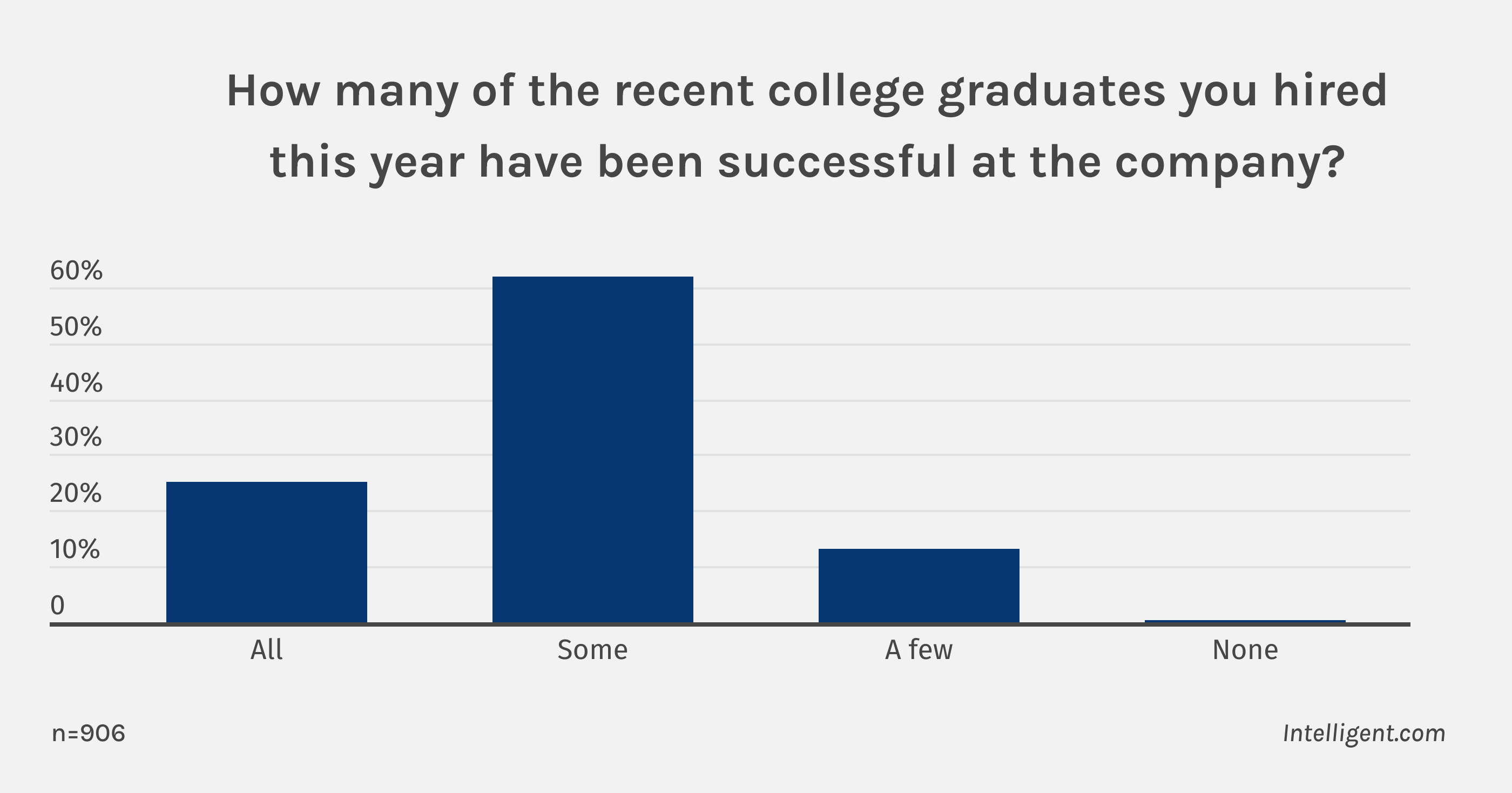
The most frequently cited reasons for why these hires didn’t work out were a lack of motivation or initiative (50%), poor communication skills (39%), and a lack of professionalism (46%). Other factors included poor communication skills (39%), struggles with feedback (38%), and inadequate problem-solving abilities (34%).
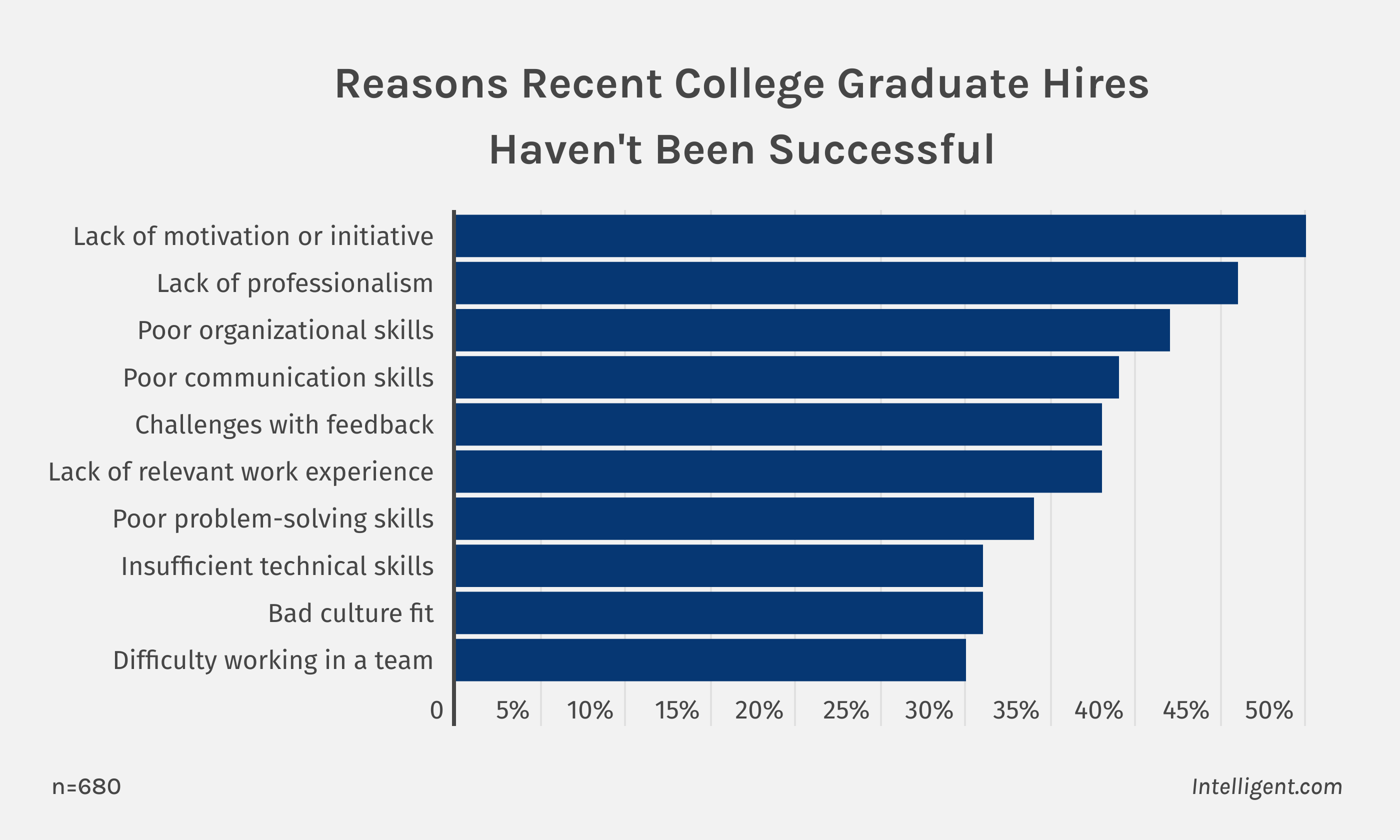
6 in 10 companies had to fire a recent college grad hire this year
A majority of companies (79%) report that they had to place at least some of these underperforming hires on performance improvement plans, and 60% report some were eventually fired.
“Many recent college graduates may struggle with entering the workforce for the first time as it can be a huge contrast from what they are used to throughout their education journey. They are often unprepared for a less structured environment, workplace cultural dynamics, and the expectation of autonomous work. Although they may have some theoretical knowledge from college, they often lack the practical, real-world experience and soft skills required to succeed in the work environment. These factors, combined with the expectations of seasoned workers, can create challenges for both recent grads and the companies they work for,” says Intelligent’s Chief Education and Career Development Advisor, Huy Nguyen.
“It can be easy for managers to buy into typical stereotypes of Gen Z and dismiss them entirely; however, companies have an equal responsibility to prepare recent graduates for their particular workplace and give them the best chance to succeed. By understanding the challenges of Gen Z workers, companies can take a more proactive approach by implementing formal employee onboarding programs that clearly outline company culture and expectations. Paring recent grads with mentors in the company can also pay huge dividends as that can provide Gen Z workers with the guidance, feedback, and support for them to succeed.”
More Than Half of Hiring Managers Say Recent Grads Are Unprepared for the Workforce
Hiring managers have several concerns about recent graduates in the workplace.
Nearly two-thirds (65%) of hiring managers surveyed believe that recent college graduates are entitled, and 63% think they get offended too easily. Additionally, more than half (55%) believe they lack a work ethic, and 54% say they don’t respond well to feedback. Similarly, 53% feel that Gen Z college graduates are unprepared for the workforce and believe they have poor communication skills.
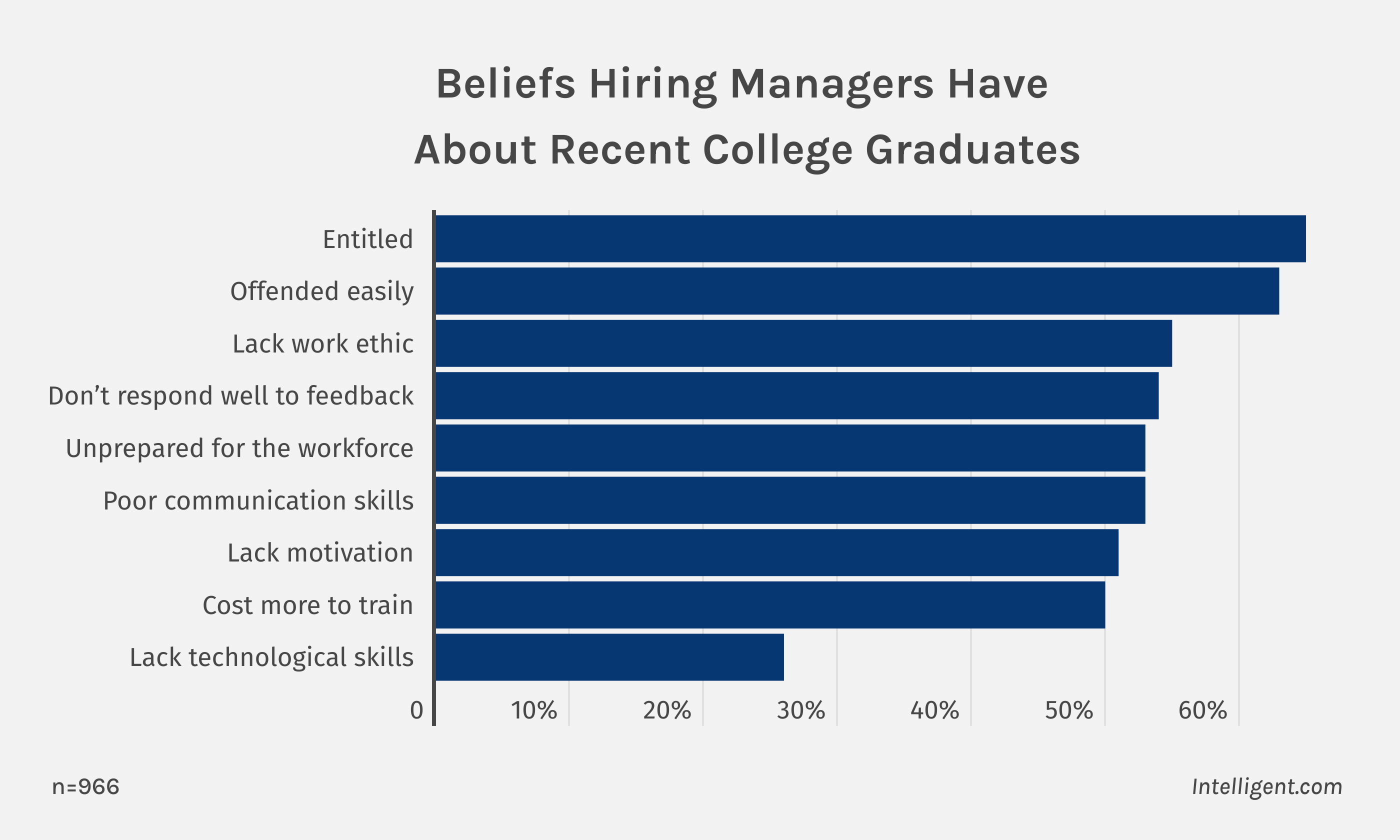
1 in 5 say they often can’t manage the workload and are unprofessional
More than one-fifth (21%) of hiring managers report that recent college graduates often can’t manage the workload. About 20% say they are often late to start work and 19% notice they often don’t dress professionally. Additionally, 19% find that they often don’t use appropriate language for work, while 18% observe they are often late to meetings. Around 17% believe they are often too difficult to manage, and 15% report they often hand assignments in late.
“Recent graduates starting their first job should demonstrate professionalism, not by conforming to outdated norms, but by being respectful and committed to their work. Begin by observing and understanding the company culture and how colleagues interact. Take the initiative to ask thoughtful questions, seek feedback, and apply it to show your motivation for personal growth. Build a reputation for dependability by maintaining a positive attitude, meeting deadlines, and volunteering for projects, even those outside your immediate responsibilities,” says Nguyen.
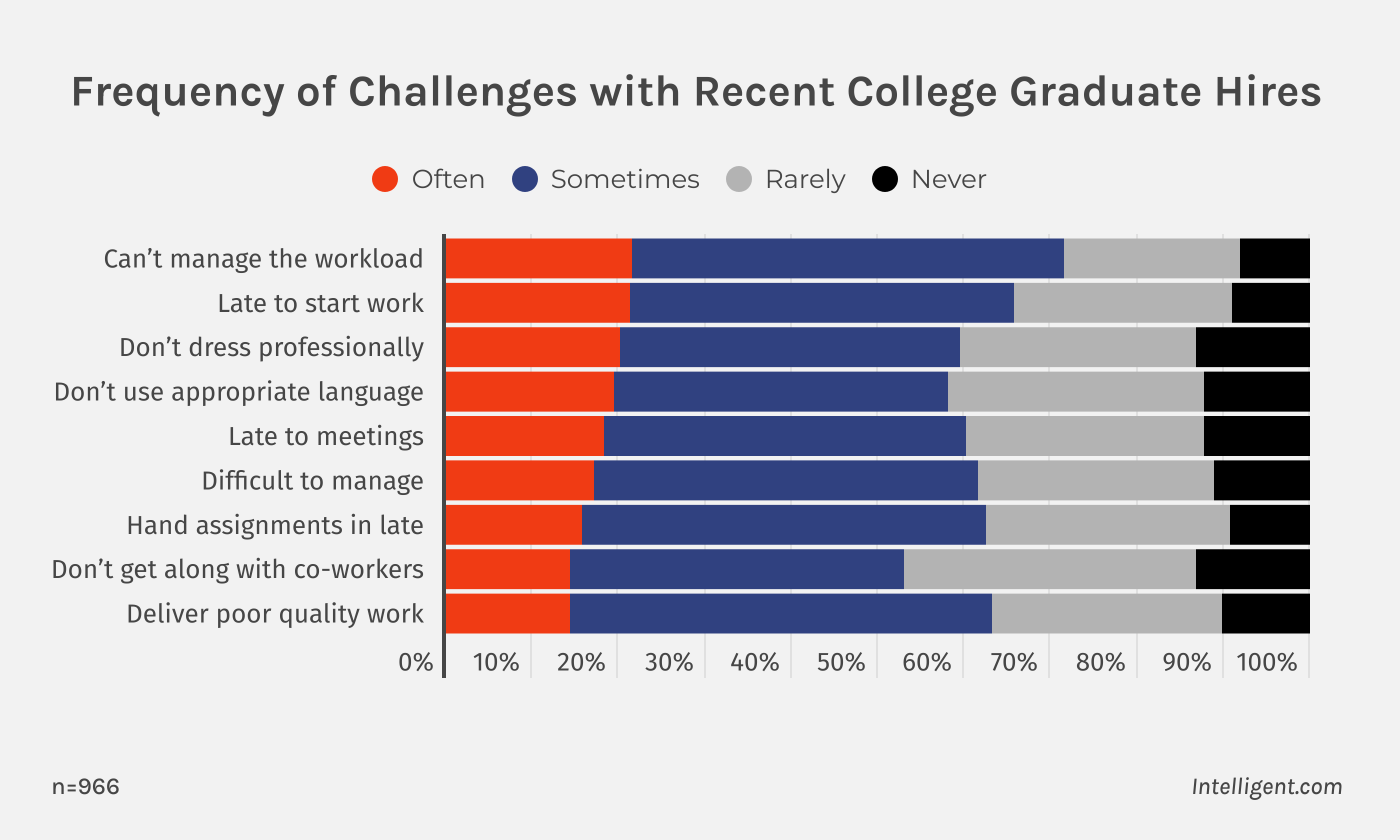
Nearly half (46%) of hiring managers believe that college graduates should definitely take office etiquette training, while 42% think they probably should.
Currently, 54% of companies offer such training, 48% make it mandatory for all new hires, 24% specifically require it for all Gen Z hires, and 16% mandate it for everyone at the company.
1 in 7 Companies May Not Hire Recent College Graduates in 2025
The majority (84%) of companies do plan to hire recent college graduates in 2025, while about 5% do not, and 10% are unsure.
For the companies not planning to hire recent graduates, the main reasons include not hiring for entry-level positions (51%), concerns about Gen Z’s preparedness for the workforce (31%), and high turnover rates among recent graduates (31%). Other factors include past negative experiences with recent graduates (27%) and a focus on internal promotions or transfers (22%).
1 in 6 Hiring Managers Are Hesitant to Hire Recent College Grads
One-quarter of hiring managers say they would feel extremely enthusiastic about hiring a recent college graduate for an entry-level position, and 34% would feel somewhat enthusiastic. About 25% feel neutral, while 13% are somewhat hesitant, and 4% are extremely hesitant.
“When interviewing recent grads, it’s important for hiring managers to adapt their process to be more tailored to candidates who have no or little job experience. Allow candidates opportunities to demonstrate their potential beyond what is written in their resume or their limited real-world experience. Ask candidates about situations in their educational journey or projects they have worked on that may be similar to what they may experience in the workplace. Focus on potential over experience by evaluating candidates who have demonstrated adaptability, problem-solving, and coachability. These traits can show they have the mindset to better succeed in the workplace,” says Nguyen.
Stronger work ethic and better attitude would make recent college graduates more hirable
When those who responded they were neutral or hesitant about hiring a recent college graduate were asked what would make them more inclined to do so, 57% indicate that showing initiative would be a key factor, and 56% say exhibiting a positive attitude is important.
Additionally, 54% are more inclined to hire a candidate who demonstrates a strong work ethic, and 53% value adaptability. Being open to feedback (50%) and punctual and reliable (49%) are also important factors.
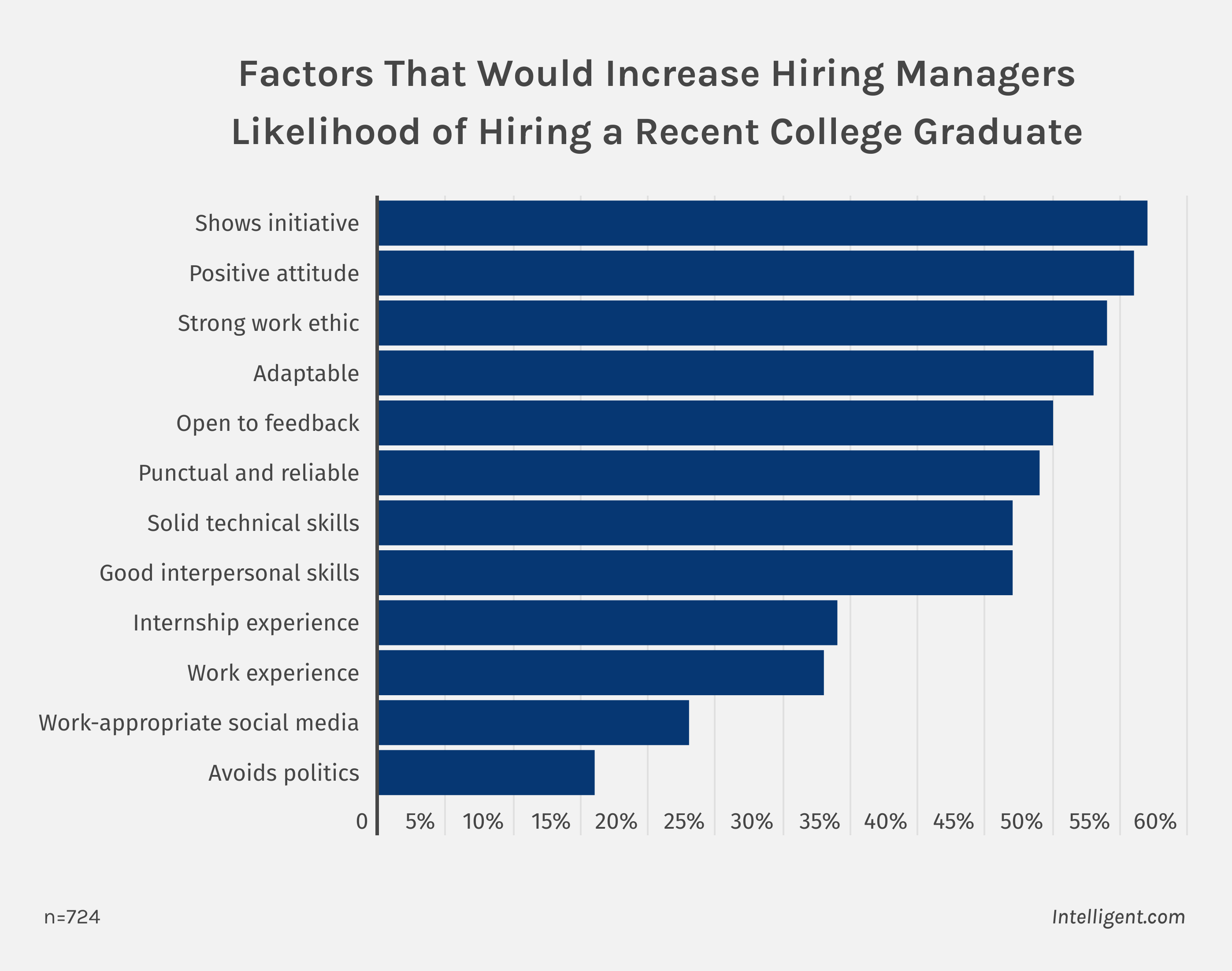
“Recent college graduates interviewing for their first job should take the initiative to thoroughly research the company they are interviewing for. Doing the research and sharing your perspective in the interview shows that you have a genuine interest in the company and are committed to being a part of what they do. They should also emphasize their ability to work with others in unfamiliar environments and their desire to learn new things quickly. I suggest they use specific examples from academic projects, internships, or out-of-classroom activities to show how they have developed these skills,” says Nguyen.
Methodology
This online poll was commissioned by Intelligent.com and conducted on Pollfish in August 2024. In total, 966 business leaders completed the survey.
Demographic criteria and screening questions were used to ensure qualified respondents. This criteria included age (25+), household income (>$75,000), organizational role (c-level executive, human resources manager, director, president, owner/partner, and senior management), company size (>10), and education (technical college, college, or postgraduate). Respondents also had to pass through screening questions to ensure their involvement in hiring for entry-level positions at their company.